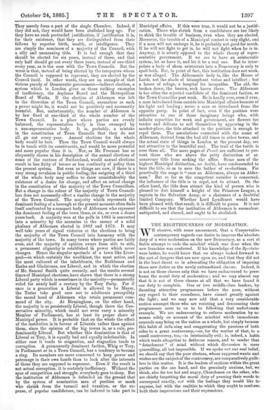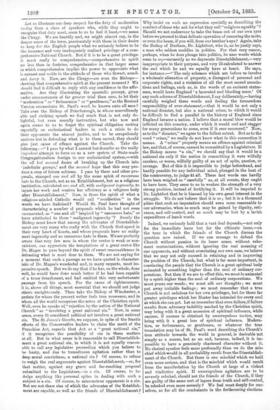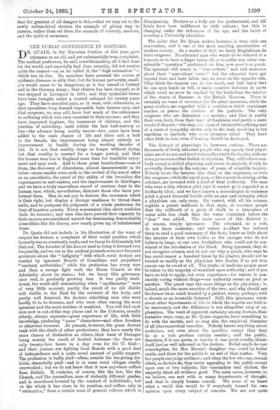THE RIGHTEOUSNESS OF MODERATION.
WE observe, with some amusement, that a Conservative contemporary regards our desire to impress the absolute duty of a wise moderation on the new Democracy, as a sort of, feeble attempt to undo the mischief which was done when the new franchise was conferred. If his knowledge of the Spectator were better, he would know that we always looked forward to the sort of dangers that are now upon us, and that they did not in the least daunt us in advocating the obligation of imposing those new duties on the newly enfranchised classes. Indeed, it. is not on those classes only that we have endeavoured to press. home the moral duty of moderation ; and we may almost say that it is not of those classes at all that we have found it our duty to complain. One or two middle-class leaders, by flaunting attractive programmes before the poor, without. any regard to their soundness, have sinned greatly against the light ; and we may now add that a very considerable section amongst those who are resisting and denouncing their programmes seem to us to be following that unfortunate example. We are endeavouring to enforce moderation by no- means solely on account of the mischief which immoderate counsels may bring on the nation as a whole, but simply because this habit of inflaming and exaggerating the passions of both sides to a great controversy,—or, for the matter of that, to a small controversy, too,—is intrinsically evil; is, indeed, a habit. whichtends altogether to dethrone reason, and to render that, " detachment " of mind without which discussion is mere quarrelling, all but impossible. If we spoke out our real belief, we should say that the poor electors, whose supposed wants an& wishes are the subject of the controversy, are comparatively guilt- less in this matter. It is the leaders of sections within the great parties on the one hand, and the genuinely anxious, but, we- think, also far too hot and angry, Churchmen on the other, who- are chiefly forgetting the moral duty of pruning their words to- correspond exactly, not with the feelings they would like to. express, but with the realities to which they ought to conform, both their impressions and their expressions. Lot us illustrate our deep respect for the duty of moderation to-day from a class of speakers who, while they ought to recognise that duty most, seem to us to feel it least,—we mean the Clergy. We are heartily and, we might almost say, in the deeper sense of the term, passionately with them in their desire to keep for the English people what we seriously believe to be the immense and very inadequately realised privilege of a com- prehensive National Church. Bnt if it is to be a great privileges it must really be comprehensive,—comprehensive in spirit no less than in doctrine, comprehensive in that larger sense in which comprehension implies the power to appreciate what is earnest and noble in the attitude of those who thwart, assail, and decry it. Now, are the Clergy—are even the Bishops— showing that comprehensive spirit at the present moment ? We should find it difficult to reply with any confidence in the affir- mative. Are they illustrating the apostolic precept, given under circumstances of far greater trial than ours, to let their " moderation " or " forbearance " or "gentleness," as the Revised Version retranslates St. Paul's word, be known unto all men ? Take even the Bishop of Peterborough, in whose marvellously able and striking speech we find much that is not only de- lightful, but even morally instructive, but who now and again seems to us to forget the spiritual obligation resting. especially on ecclesiastical leaders in such a crisis to do their opponents the utmost justice, and to be scrupulously anxious lest in defending what is to them sacred, they should give just cause of offence against the Church. Take the following :—" I pass by what I cannot but describe as the really impudent attempt to force on us a new system of State-made Congregationalism foreign to our ecclesiastical system,—with the all but avowed desire of breaking up the Church into indefinite groups,' and the avowed hope that this may pro- duce a crop of future schisms. I pass by these and other pro- posals, stamped one and all by the same spirit of rancorous hate to the Church, not as an Establishment, but as a religions institution, calculated one and all, with malignant ingenuity, to injure her work and weaken her efficiency as a religious body after Disestablishment." Now, is there the spirit of what a religious-minded Catholic would call "recollection" in the words we have italicised P Would St. Paul have thought of characterising a number of proposals which he had not even enumerated, as "one and all" inspired by "rancorous hate," or have attributed to them " malignant ingenuity "? Surely the Bishop must know that among the advocates of Disestablish- ment are very many who really wish the Church God-speed in their very heart of hearts, and whose proposals have no malig- nant ingenuity and no rancorous hate in them. We are perfectly aware that very few men in whom the orator is weak or non- existent, can appreciate the temptations of a great orator like Dr. Magee to pass beyond the spirit of sweet reasonableness in defending what is most dear to them. We are not saying for a moment that such a passage as we have quoted is character- istic of Dr. Magee's wonderful and, in many respects, most im- pressive speech. But we do say that if he has, on the whole, done well, he would have done much better if he had been capable of a truer detachment, and had omitted this very unfortunate passage from his speech. For the cause of righteousness, it is, above all things, most essential that we should not judge others unrighteously. Then take the Bishop of Winchester, a prelate for whom the present writer feels true reverence, and in whom all the world recognises the notes of the Christian spirit. Well, even he speaks o(" rejection by the =lion of the National Church" as "involving a great national sin." Now, in some sense, every ill-considered political act involves a great national sin. The St. James's Gazette, we suppose, in spite of the frantic efforts of the Conservative leaders to claim the merit of the Franchise Act, regards that Act as a "great national sin," if it recognises the possibility of sin in these matters at all. But in what sense is it reasonable to call Disestablish- ment a great national sin, in which it is not equally reason- able to call any legislative proceeding which you believe to be hasty, and due to tumultuous agitation rather than to
deep moral convictions, a national sin Of course, to refuse to weigh the real arguments against Disestablishment—or, for that matter, against any grave and far-reaching proposal submitted to the Legislature,—is a sin. Of course, to in- dulge anything like personal spites in dealing with such a subject is a sin. Of course, to misconstrue opponents is a sin. But are not these sins of which the advocates of the Establish- ment are capable, as well as the friends of Disestablishment Why insist on such an expression specially as describing the conduct of those whc ask for what they call "religious equality"? Should we not endeavour to take the beam out of our own eyes before we proceed to that delicate operation of removing the mote, or even the beam, if you will, from our brother's eye? Again, take the Bishop of Durham, Dr. Lightfoot, who is, as he justly says, a man who seldom meddles in politics. For that very reasor, perhaps, when he does plunge into politics, he uses words which seem to us,—earnestly as we deprecate Disestablishment—very inappropriate to their purpose, and very ill-calculated to answer the end which he and we equally have at heart. He says, for instance :--" The only schemes which are before us involve a wholesale alienation of property, a disregard of personal and corporate rights, and a violation of all the most sacred associa- tions and feelings, such as, in the words of an eminent states- man, would leave England a lacerated and bleeding mass.' Of any such scheme of Disestablishment, I say deliberately,—having carefully weighed these words and feeling the tremendous responsibility of over-statement, —that it would be not only a national disaster, but also a national crime, to which it would be difficult to find a parallel in the history of England since England became a nation. I believe that a moral blow would be inflicted on this country, under which it would reel and stagger for many generations to come, even if it ever recovered." Now, as to the" disaster," we agree to the fullest extent. But as to the word "crime," we really do not know what in this connection it means. A "crime" properly means an offence against criminal law, and that, of course, cannot be committed by a Legislature. If the Bishop means "a sin," we should say that it would be a national sin only if the nation in committing it were wilfully careless, or worse, wilfully guilty of an act of spite, passion, or revenge. But of this it is impossible to judge beforehand, and hardly possible for any individual mind, plunged in the heat of the controversy, to judge ltt all. These last words can hardly have been weighed so " carefully " as, at all events, they ought to have been. They seem to us to weaken the strength of a very strong position, instead of fortifying it. It will be imputed to Dr. Lightfoot that he is biassed by his own great interest in the struggle. We do not believe that it is so ; but it is a thousand pities that such an imputation should even seem reasonable to our adversaries, when so much may be gained by dignity, reti- cence, and self-control, and so much may be lost by a lavish expenditure of harsh words.
Indeed, we seriously hold that a vast deal depends,—not only for the immediate issue but for the ultimate issue,—on the tone in which the friends of the Church discuss the question now raised. If we can manage to defend the Church without passion in its baser sense, without vehe- ment recriminations, without ignoring the real meaning of our opponents, and without overstating our own case, we believe that we may not only succeed in retaining and in improving the position of the Church, but what is far more important, in convincing the people that the Church is a great spiritual body animated by something higher than the soul of ordinary cor- porations. But then if we are to effect this, we must be animated by a spirit higher than the soul of ordinary corporations. We must prune our words ; we must sift our thoughts ; we must put away irritable feelings ; we must remember that a true Church is not sedulous for her own privileges, but for those far greater privileges which her Master has intended for every soul at which she can get. Let us remember that even failure, if failure results from advocacy indelibly marked by the Christian spirit, may bring with it a great accession of spiritual influence, while success, if success is obtained by unscrupulous tactics, may bring with it a great loss of spiritual influence. Modera- tion, or forbearance, or gentleness, or whatever the true translation may be of St. Paul's word describing the Church's true attitude towards the world in general, is desirable not simply as a means, but as an end, because, indeed, it is im- possible to have a genuinely chastened character without it. No clerical speaker feels more profoundly than we do the mis- chief which would in all probability result from the Disestablish- ment of the Church. But there is one mischief which we hold even more serious, and that is the -mischief which would result from the manifestation by the Church at large of a violent and vindictive spirit. If unscrupulous agitators are to be severely rebuked, should not the friends of the Church, if they are guilty of the same sort of lapses from truth and self-control, be rebuked even more severely P We feel most deeply for our- selves, as for all the combatants in the forthcoming elections
that the greatest of all dangers is this,—that we may set to the newly enfranchised electors the example of giving way to passion, rather than set them the example of sobriety, candour, and the spirit of reverence.




































 Previous page
Previous page